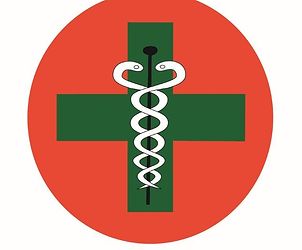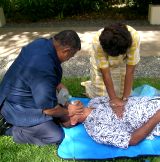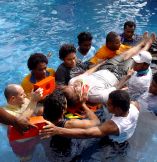Intermediate Emergency Care recognizes the importance of Oxygen as an essential tool to treat Shock and many other major emergencies especially if Remoteness is a factor.
Intermediate Emergency Care (1.5 Day course)
- Provide enhanced basic life support
- Provide first aid until help arrives.
- Manage first aid in emergency situations.
- Manage cardio pulmonary resuscitation, mouth to mouth, bag mask, oxygen therapy equipment, positioning of the patient, major haemorrhage control.
Introduction:
By the end of this course participants will be able to provide comprehensive emergency care assistance for a prolonged period of time whilst emergency services arrive, manage an emergency situation skilled in scene management, risk identification, comprehensive first aid and local emergency services expectations and capacity. This course takes into account the participants may not have the support of normal emergency services.
Intermediate Emergency Care incorporates the skills learnt in Basic Emergency Care and builds on them with the treatment of more severe medical conditions such as; electrical injuries, chemical burns, chest & abdominal injuries, allergic reactions & heat stroke. This course meets the NZ OSH requirements for ‘workplace first aider’.
SESSION OBJECTIVES:
By the end of this session the participants will provide Intermediate life support and CPR including;
- Be competent in Scene Management, Site survey & Triage
- Ascertain information from Patient Assessment and base line recordings
- Be competent in intermediate Air Way Management
- Be proficient in administering Bag mask to mouth CPR
- Be cognizant in Use of sphygmomanometer and stethoscope
- Apply Oxygen Therapy and management
- Have knowledge and experience in the use of metered dose inhalers
- Understand the physiology of Drowning
- Manage and prevent Major Bleeding & Shock
- Be proficient in Spinal Injury management
- Be competent in the moving and shifting patients in complex situations
- Perform Environmental Emergency Management
- Manage Chest Injury & Asthma
- Manage Extensive Fracture & soft tissue management
DURING THIS SESSION PARTICIPANTS WILL ALSO:
- Recognize risk factors as factors in trauma care and work towards eliminating or managing them
- Be able to link emergency care with the necessity to prevent a crisis with efficiency to minimize further trauma
- Incorporate specialized emergency equipment into their emergency care skill base




